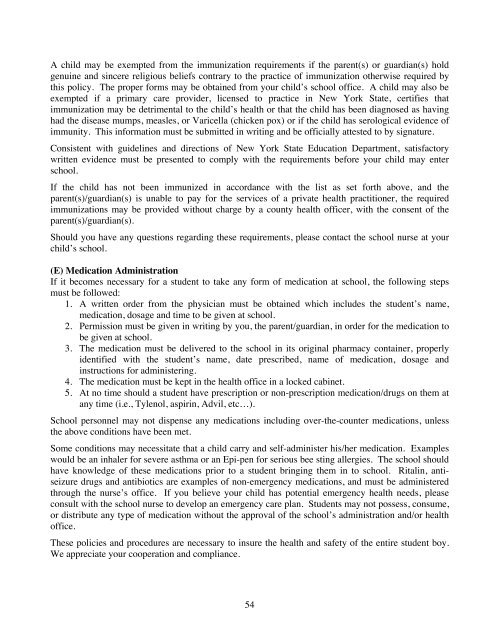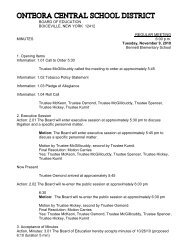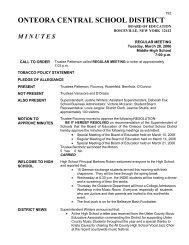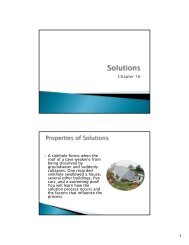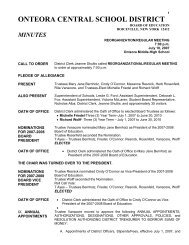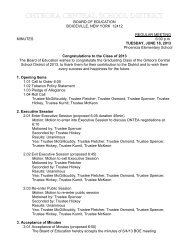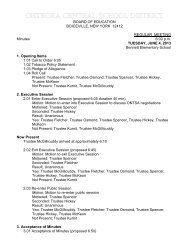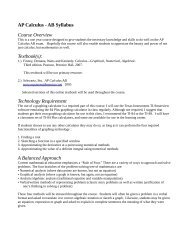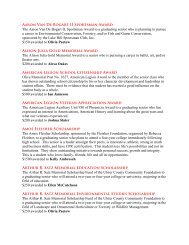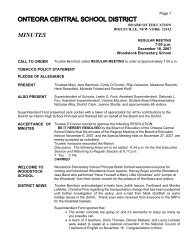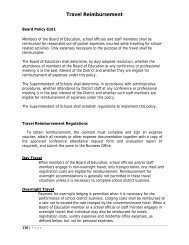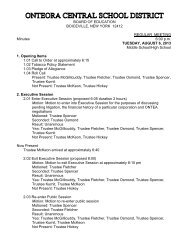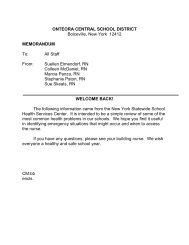Student/Parent Handbook - Onteora Central School District
Student/Parent Handbook - Onteora Central School District
Student/Parent Handbook - Onteora Central School District
- No tags were found...
Create successful ePaper yourself
Turn your PDF publications into a flip-book with our unique Google optimized e-Paper software.
A child may be exempted from the immunization requirements if the parent(s) or guardian(s) holdgenuine and sincere religious beliefs contrary to the practice of immunization otherwise required bythis policy. The proper forms may be obtained from your child’s school office. A child may also beexempted if a primary care provider, licensed to practice in New York State, certifies thatimmunization may be detrimental to the child’s health or that the child has been diagnosed as havinghad the disease mumps, measles, or Varicella (chicken pox) or if the child has serological evidence ofimmunity. This information must be submitted in writing and be officially attested to by signature.Consistent with guidelines and directions of New York State Education Department, satisfactorywritten evidence must be presented to comply with the requirements before your child may enterschool.If the child has not been immunized in accordance with the list as set forth above, and theparent(s)/guardian(s) is unable to pay for the services of a private health practitioner, the requiredimmunizations may be provided without charge by a county health officer, with the consent of theparent(s)/guardian(s).Should you have any questions regarding these requirements, please contact the school nurse at yourchild’s school.(E) Medication AdministrationIf it becomes necessary for a student to take any form of medication at school, the following stepsmust be followed:1. A written order from the physician must be obtained which includes the student’s name,medication, dosage and time to be given at school.2. Permission must be given in writing by you, the parent/guardian, in order for the medication tobe given at school.3. The medication must be delivered to the school in its original pharmacy container, properlyidentified with the student’s name, date prescribed, name of medication, dosage andinstructions for administering.4. The medication must be kept in the health office in a locked cabinet.5. At no time should a student have prescription or non-prescription medication/drugs on them atany time (i.e., Tylenol, aspirin, Advil, etc…).<strong>School</strong> personnel may not dispense any medications including over-the-counter medications, unlessthe above conditions have been met.Some conditions may necessitate that a child carry and self-administer his/her medication. Exampleswould be an inhaler for severe asthma or an Epi-pen for serious bee sting allergies. The school shouldhave knowledge of these medications prior to a student bringing them in to school. Ritalin, antiseizuredrugs and antibiotics are examples of non-emergency medications, and must be administeredthrough the nurse’s office. If you believe your child has potential emergency health needs, pleaseconsult with the school nurse to develop an emergency care plan. <strong>Student</strong>s may not possess, consume,or distribute any type of medication without the approval of the school’s administration and/or healthoffice.These policies and procedures are necessary to insure the health and safety of the entire student boy.We appreciate your cooperation and compliance.54


